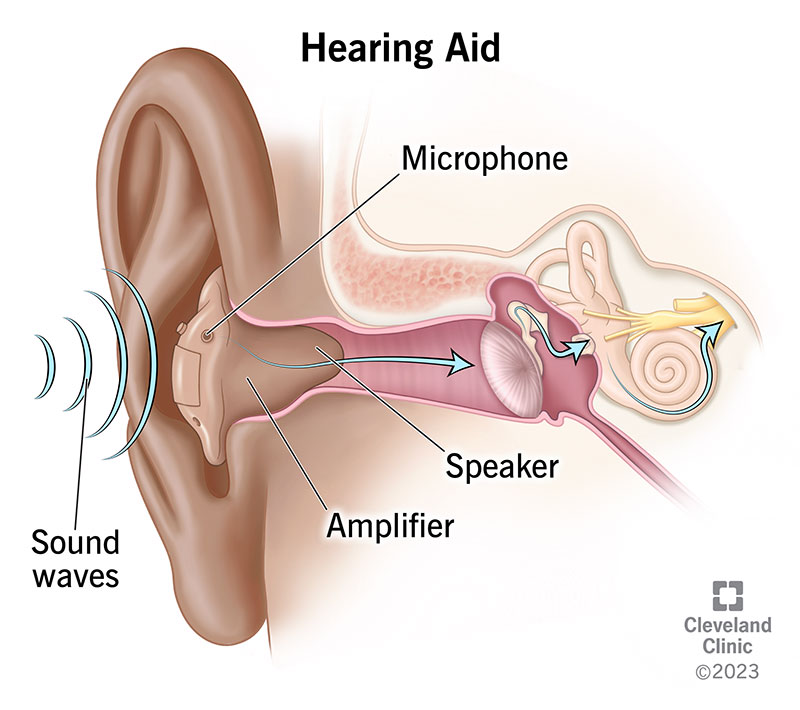Hearing aids are small, electronic devices that amplify sounds and deliver them to your ear. These devices help people with hearing loss improve hearing and speech comprehension, so they can participate more fully in daily life.
Advertisement
Cleveland Clinic is a non-profit academic medical center. Advertising on our site helps support our mission. We do not endorse non-Cleveland Clinic products or services. Policy

Image content: This image is available to view online.
View image online (https://my.clevelandclinic.org/-/scassets/Images/org/health/articles/24756-hering-aids)
A hearing aid is a small, electronic device worn behind or inside your ear that improves access to sound. Hearing aids make sounds louder, so many people with hearing loss can interact with others more easily. They can’t restore your natural hearing. But if you’re straining to hear or asking others to repeat themselves a lot, hearing aids may help.
Advertisement
Cleveland Clinic is a non-profit academic medical center. Advertising on our site helps support our mission. We do not endorse non-Cleveland Clinic products or services. Policy
There are different types of hearing aids, including prescription and over-the-counter (OTC) ones. There are lots of styles you wear differently. Some are more noticeable, while others are hard to see. They include:
A hearing specialist called an audiologist can help you find the style and fit that work best for you.
Hearing aids contain different parts that work together to amplify (boost) sound. Although the specifics can vary based on the type, here are the basic parts of a hearing aid and how they work:
Some hearing aids have disposable batteries you replace. But most use rechargeable ones. You can charge your hearing aids like you charge a smartphone.
Generally, audiologists perform hearing aid evaluations. Your primary care physician (PCP) or otolaryngologist (ENT) can refer you. But some audiologists will see you without a referral.
Advertisement
First, you’ll need a hearing test. This is a separate appointment that comes before a hearing aid evaluation. This test determines whether you have hearing loss and whether hearing aids might help. What happens next depends on whether you get over-the-counter or prescription hearing aids.
You can buy OTC hearing aids in most pharmacies, big-box stores and online. You’ll get prescription hearing aids from your audiologist.
Most people can use the same hearing aids for six to seven years. This means that in most cases, you can update your existing devices instead of having to buy a new one.
If you have hearing loss, the recommendation is that you get an updated hearing test each year. Your audiologist can reprogram your hearing aids based on the changes.
Hearing aids can help you hear better. They can’t cure hearing loss, but they can turn the volume up on conversations you don’t want to miss. Many have features that can reduce sounds you don’t want to hear (like background noise).
In some cases, hearing aids can ease symptoms that often accompany hearing loss, like ringing in your ears (tinnitus). Depending on the cause of your symptoms, amplifying desired sounds may reduce tinnitus over time. Some types of prescription hearing aids are designed to help with tinnitus.
According to research, by helping you hear better, hearing aids can help keep your thinking sharp. Hearing aids can also combat social isolation and depression by helping you engage with others. This is especially important for people who are high risk of dementia as they get older.
Your audiologist will tell you how to clean and care for your hearing aids. Here are some general guidelines:
Advertisement
One of the best things you can do is to prepare for minor hiccups as you adjust to your hearing aids. It can take several months to get used to them. It’s useful to know what challenges to expect and how you can manage them:
Advertisement
Call your audiologist if you have any questions about how to use or care for your hearing aids. Let them know if they’re not helping enough. They may need to fine-tune the settings for you.
The important thing is not to give up. It can be tempting to set your hearing aids aside in the beginning if they don’t feel right or work as you expected. But the better option is to contact your audiologist to adjust prescription hearing aids. If OTC ones aren’t helping, it may be time to see an audiologist for prescription hearing aids instead.
It depends on what’s causing your hearing loss and its severity. A hearing aid won’t help if the structures inside your inner ear are severely damaged. You may need other treatments depending on the cause of your hearing loss. For some people, a cochlear implant is a more appropriate option when hearing aids aren’t helping enough.
Many people who could benefit from hearing aids don’t use them. Especially when hearing loss is gradual, it may not be obvious how much it’s reducing your quality of life. But hearing keeps your brain engaged. It keeps the give-and-take of everyday conversations flowing. It has a huge impact on your overall health and well-being. This is why it’s a good idea to see an audiologist if you think you have hearing loss. They can let you know if there’s an issue. They can advise you on whether hearing aids might help.
Advertisement
Learn more about the Health Library and our editorial process.
Cleveland Clinic's health articles are based on evidence-backed information and review by medical professionals to ensure accuracy, reliability, and up-to-date clinical standards.
Cleveland Clinic's health articles are based on evidence-backed information and review by medical professionals to ensure accuracy, reliability, and up-to-date clinical standards.
Hearing is an important part of your everyday life. Hearing loss can impact your life in so many ways. Cleveland Clinic experts can help you hear clearly again.
